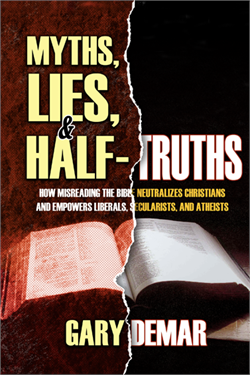A popular belief that ends up disengaging Christians from applying God’s Word to every area of life in a way that would realize long-term change is the belief that we are at the point in history that the end is near. We’re repeatedly told that the world is in such bad shape that our only hope is the “rapture of the church” or some other end-time event that is always on the immediate horizon. We are being carried along by the sands of prophetic inevitability. We build a sandcastle, and the tide comes in and destroys it. This happens every time we go to the beach, and it happens generationally because the foundation of our worldview lacks solid worldview grounding not because some prophetic event is just around the corner as predictable as the tides. Tide charts are predictable, but the supposed predictable prophetic end time charts are not. They never have been. Prophetic speculators are using the wrong prophetic timetables, and too many Christians have followed them for multiple generations. One would think that Christians would build off the beach and scrap the overused and always erroneous prophetic timetables.
The world is a mess, but it’s not the end of the world as we know it mess.[1] The world has always been a mess to various degrees. You would never know this because of books like David Jeremiah’s foray into misapplying what Jesus said about Bible prophecy in his book The World of the End: How Jesus’ Prophecy Shapes our Priorities (2022). He’s not the only one as the number of end-time speculative books, going back centuries, continues to take up space on my bookshelves. The prophecy he describes that he claims is on the horizon, is what was going to take place before that Apostolic generation passed away (Matt. 24:34), and that was nearly 2000 years ago.[2] Like a recurring nightmare, we’re forced to relive end-time horrors every day in every earthquake, war, heatwave, medical scare, and the incessant tick of the doomsday clock as precious seconds tick by.

Wars and Rumors of Wars
A first-century interpretation of the Olivet Discourse was once common in commentaries and narrative-style books that describe the fall of Jerusalem in AD 70. There is also a history of skeptics who turn to Bible prophecy and claim Jesus was wrong about the timing of His coming at “the end of the age” and the signs associated with it. A mountain of scholarship shows that the prophecy given by Jesus was fulfilled in exacting detail when He said it would: before the generation of those to whom He was speaking passed away.
Buy NowWilliam Edgar, a professor of apologetics at Westminster Theological Seminary, recounts the time in the 1960s he spent studying in L’Abri, Switzerland, under the tutelage of Christian apologist and cultural critic Francis Schaeffer.[3]
I can remember coming down the mountain from L’Abri and expecting the stock market to cave in, a priestly elite to take over American government, and enemies to poison the drinking water. I was almost disappointed when these things did not happen.[4]
Edgar speculated, with good reason, that it was Schaeffer’s eschatology that negatively affected the way he saw and interpreted world events. Schaeffer was good at diagnosing the disease, but he found it difficult to prescribe a cure because the patient and his cultural malady were never going to get well. One of Schaeffer’s last books, A Christian Manifesto, did not call for cultural transformation but civil disobedience as a stopgap measure to postpone an inevitable societal decline.
The fact remains that Dr. Schaeffer’s manifesto offers no prescriptions for a Christian society…. The same comment applies to all of Dr. Schaeffer’s writings: he does not spell out the Christian alternative. He knows that you “can’t fight something with nothing,” but as a premillennialist, he does not expect to win the fight prior to the visible, bodily return of Jesus Christ to earth to establish His millennial kingdom.[5]
This view has been true for millions of Christians. There is no doubt that many Christians are otherworldly and have no interest in culture or the dirty business of politics. Many more Christians are eschatologically schizophrenic. They believe that we are living in the last days but still engage society at some level but with no real hope that any fundamental change will happen.
Economic, political, moral, and religious conditions seemed to have set the world on the brink of destruction numerous times in history. Economic circumstances were so bad in Israel thousands of years ago that some people resorted to cannibalism (Deut. 28:53-57; 2 Kings 6:28-29; Jer. 19:9). Josephus relates an account of a woman who killed, cooked, and ate her own child during the siege of Jerusalem that ended in AD 70. The story is horrendous.[6]
Josephus, the first-century Jewish author widely read and adapted by Christians, does indeed use his Jewish War to tell a spectacularly gruesome and dramatic story about a wealthy Jewish woman named Mary who ate her own child; she was discovered eating cooked meat during Titus’ siege of Jerusalem, only to identify the meat as her son and offer her questioners the other half of his body.
*****
The descriptions of child-eating in the Bible are not uniquely Jewish: in the context of covenants or treaties, they appear as threats in other ancient Near Eastern documents, and in the context of dramatic siege narratives, they seem to recur throughout human history.[7]
There have been other economic crises in the not-too-distant past, and we have weathered them: The Great Depression and Dust Bowl in the United States and the hyperinflation in Germany where the United States dollar was worth 4 trillion German marks. We can include two world wars, prime indicators used by the prophetic speculators that the end was near in their day.

Myths, Lies, and Half-Truths
Myths, Lies, and Half-Truths takes a closer look at God's Word and applies it to erroneous misinterpretations of the Bible that have resulted in a virtual shut-down of the church's full-orbed mission in the world (Acts 20:27). Due to these mistaken interpretations and applications of popular Bible texts to contemporary issues, the Christian faith is being thrown out and trampled under foot by men (Matt. 5:13).
Buy NowAs a result, dispensationalists argued, “The church is largely parenthetic, thus unimportant. The teachings of Scripture have largely to do with the Jews alone. The Sermon on the Mount is largely for the Jews. The Lord’s prayer is for the Millennium rather than for the Church.”[8] As a result, Christians check the hourglass of time running out and wait in vain for a rapture that is always promised but never comes. Dr. Gary North pointed out the problem:
To escape this inherent despair, fundamentalists have turned to their own version of the humanists’ escape hatch: an upper-story universe. This upper story is the world of faith, expectation, and hope: the heavenly realm. It is a hope in heaven—a world above and beyond this world of Christian powerlessness and defeat.[9]
And that’s the problem. It didn’t use to be this way. Every area of life was seen as a place for the application of God’s Word, even among those who did not embrace Jesus as Lord and Savior. The world worked the way it did because God made it that way. As a result, Western Civilization flourished. In time, however, many people believed that impersonal nature predominated. God was not needed in a clockwork universe. The blind watchmaker was in charge. The Christian response was to reformulate theologically. A sacred-secular divide was developed coupled with an eschatology that put Christians on their prophetic seat anticipating an any-moment rapture of the church to relieve them of the task of cultural change.
[1] J.D. King, Why You’ve Been Duped Into Believing that Word is Getting Worse (Lees Summit, MO: Christos Publishing, 2019).
[2] Gary DeMar, Wars and Rumors of Wars, 2nd ed. (Powder Springs, GA: American Vision, [2017] 2023).
[3] Colin Duriez, Francis Schaeffer: An Authentic Life (Wheaton, IL: Crossway Books, 2008), 42.
[4] William Edgar, “Francis Schaeffer and the Public Square” in J. Budziszewski, Evangelicals in the Public Square: Four Formative Voices on Political Thought and Action (Grand Rapids, MI: Baker Academic, 2006), 174.
[5] Gary North and David Chilton, “Apologetics and Strategy,” in Tactics of Christian Resistance: A Symposium, ed. Gary North (Tyler Texas: Geneva Divinity School, 1983), 127-128. Emphasis in original.
[6] Rabbi Wendy Love Anderson, “Parents Eating their Children—The Torah’s Curse and Its Undertones in Medieval Interpretation,” The Torah: https://www.thetorah.com/article/parents-eating-their-children-the-torahs-curse-and-its-undertones-in-medieval-interpretation
[7] [“Recent commemorations of the 871-day siege of Leningrad during World War II include a story, attributed to the Russian author Daniil Granin, of a mother who preserved her dead son’s body in order to feed it piece by piece to her surviving daughter.” See http://www.dw.com/en/leningrad-the-city-that-refused-to-starve-in-wwii/a-19532957, among others.]
[8] Peter E. Prosser, Dispensational Eschatology and Its Influence on American and British Religious Movements (Lewiston, New York: Edwin Mellen Press, 1999), 148.
[9] Gary North, Publisher’s Foreword, in Greg L. Bahnsen and Kenneth L. Gentry, House Divided: The Break-Up of Dispensational Theology(Powder Springs, GA: American Vision, [1989] 2022), xiii-xiv.

